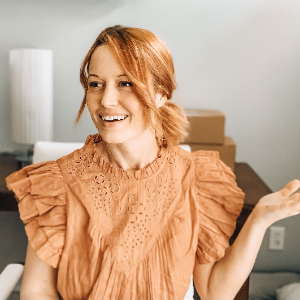A Truthful Insight Into Minimalism And Mental Health
Nov 07, 2023
I want to approach this topic of clutter-free living or minimalism and mental health. So many people swear that their anxiety or depression was completely cured when they went minimalist.
And then other people say that they disagree that mental health is at all influenced by clutter-free living. They feel that people are constantly reaching for something external to cure their mental health issues without tending to what’s going on inside.
So today, I want to share my own personal journey with minimalism and mental health. This is a behind-the-scenes truthful insight into my experience with clutter-free living as it relates to anxiety and depression, in particular.
I am in no way saying that clutter-free living is a cure for mental illness.
However, there is a direct correlation between our environments and our levels of stress, anxiety, depression, happiness, etc. It really makes sense when you think of the importance of habitats for absolutely any animal in existence – from a fish in its fishbowl to a hamster in its hamster cage, to elephants out in the wild.
Every single animal is directly and greatly influenced by its habitat. We are no different. Our habitats absolutely influence us in many ways.
A Little Back Story
Now, I’ve experienced depression and anxiety since I was at least 16 years old. At 16, I started getting treatment for it. I was afraid to socialize with other people because my face would turn bright red!
I couldn’t even hide my anxiety, because if I was talking to a boy or to new social groups, my entire body would look like a lobster. It was so embarrassing and it really deterred me from forming a lot of those relationships early on.
So trust me, I know what it‘s like to feel completely out of control of your mind and your body and to be unable to do what you want because anxiety or depression is holding you back.
It’s obviously weird and awkward to talk about, but I’m going to do it anyway because I think it’s important that people see a correlation and maybe even some kind of a hopeful method to relieve the tension, stress, anxiety, and depression that you may be experiencing on a daily basis
I came into minimalism because of my mental health.
One of my worst depressive episodes happened right before I came into this whole world of clutter-free and intentional living. It actually led me to where I am today. It was about a decade ago now, and one of the worst depressions I’ve ever had…maybe.
I was in one of those periods where things just felt empty. Like I couldn’t get satisfaction out of anything. Nothing felt good. Nothing made me happy. It was the whole numbing feeling. Those of you who have ever experienced depression know what that feels like. And I was looking externally for anything that was going to make me feel better.
On this happiness research journey, I came across things talking about your environment. So, I really started diving into the power of environments, which is what led me to where I am today. And it helped, you know.
It gave me some hope and some sense of control over things that I could do to make myself feel better.
Since then I’ve gotten so much better at controlling it. Whenever I start feeling just a little bit of that dampening or numbing coming on, I have a whole list of things that I go through because I know myself and I know how it works.
I now know that it’s not going to last forever. And if I do things like going out into nature, getting sunshine, moving my body, taking a walk – things that are generally counterintuitive when you’re depressed – I’m going to feel better.
#1. Our Environments Directly Impact Our Mental Health.
When I started doing research, I came across all these psychology-based studies that interested me. I’m a very left-brained analytical type of person, so it just made sense to me.
It made sense that our environment and our habitats would have a direct impact on so many things, including our mental health.
You can feel the difference in your environment.
Most of us don’t need studies or research to explain that to us – we can just feel it. You can feel the difference from walking into one space that’s more calming, has more and more spaciousness, and has more natural light. You can feel a physical difference between that and a place that feels overly crowded, dampening, and dark. Our bodies and our brains are programmed to respond to those types of differences in our environment.
Mindsets have a domino effect.
When you start changing your mindset in one area, it dominoes out into other areas as well. So, when I started to make these intentional changes to my space, I started making intentional decisions in other areas of my life. I took personal responsibility and did what I was able to do to help my mental health.
I have had very few episodes since making these changes. A big part of that I do attribute to the changes inside of my environment – creating space and a home that feels supportive to me on a daily basis.
I do think that it’s important.
It’s been a huge factor in me not having so many depressive episodes or bouts of anxiety. I used to be like a rollercoaster. I’m telling you, if you feel like you’re ever on the emotional roller coaster – highs and lows, ups and downs- that used to be me. And nowadays that is not the case. I’m very stable every day. I feel good. You know, I wake up feeling happy to be where I am.
#2. Minimalism Helped To Re-Frame The Things That Were Damaging To My Mental Health.
The concept of minimalism offered me freedom from some of the pursuits that were making me unhappy. This is something I learned early on as I was making the connection between minimalism and mental health.
It really helped me to change my personal perception of success.
I believe that was a very big factor in my depression and anxiety at the time. I didn’t feel as successful as I wanted. Or I wasn’t reaching certain standards that I was hoping to reach. And when I really started trying to get back to the core of what’s truly important, it opened up a whole new world.
It was like a weight being lifted. This mindset weight that I had had for my entire life. It reassured me that it was okay not to pursue pure success and accumulation. That it was okay to pull back, to rest, and to look toward other things for my happiness.
#3. Clutter-Free Living Offered A Built-In Support System.
So the third thing I want to share with you is a more tangible result. Close to a year ago, now, I had another depressive episode. You know, my happiness threshold just felt like it was lowered and nothing sounded satisfying. Just the same old thing. So I got up and went through my routine: I went outside, got some air, moved my body, exercised.
I started listening to my meditations which help make me feel a little more centered and balanced. And everything was fine. It was completely gone within a week or two.
My home didn’t fall apart when I needed a break.
But here’s the thing – I didn’t truly appreciate it until I was out of the fog, but I noticed that I was able to take that time for myself without everything else falling apart. I was able to withdraw and not take care of the stuff that I usually take care of. I could rest and just take that time for myself … and everything was fine.
That was so huge.
I mean, what a support system right there inside of my home! I didn’t have to come back from taking care of myself and immediately start taking care of everything else that piled on top of me while I was resting.
To me, practicing clutter-free living or minimalism means I can take a step back without being buried alive by messes and unfulfilled to-do lists. This is the MOST beneficial correlation between minimalism and mental health, in my opinion.
See the psychological effects of clutter for yourself.
Now, I don’t want you to leave today without the facts. So I’m going to direct you to this video on the psychological effects of clutter according to science. If you feel overwhelmed by clutter, trust me, it’s not just you – it’s a real thing. You can see the research around why in that article/video.



